 |
|
Feature Story
Orangutan Care Series: The Juveniles
|
|
News from the Field
Finding Resilience in the Face of Crisis for Orangutans
|
|
News from the Field
Thank You to the 2016 OFI Construction Teams!
|
|
Orangutan of the Month
Lumley
|
|
"I first met Lumley when she was transferred to the Clinic at the OCCQ. Previously Lumley had been located at one of OFI's soft release field camps. When she came to the OCCQ, Lumley was afraid of most people and emitted a high pitched squeaking sound whenever you were too close to her sleeping enclosure. I could feel how traumatized she was and wanted to try to make her feel more comfortable and less anxious...."
|
 InfiniteEARTH
, the parent company of The InfiniteEARTH
, the parent company of The
Rimba Raya Biodiversity Reserve has pledged to match up to
$100,000 in donations to OFI when you donate via the link on their website.
Since the campaign launched in May we have raised
$19,293! We're getting closer to our goal, but we still need your help and
there are only two months left!
Click the link below to donate today and help us reach
$100,000!
|
|
Orangutans need you
Thank you for being a reader of OFI's
Eyes on the Forest newsletter
Enjoy these stories? Know someone else who would, too? Please share this newsletter with your friends and family!
You can find out more about OFI & our work at our website,
And don't forget to check us out on Facebook, Twitter, Instagram, & more!
|
|
|
 |
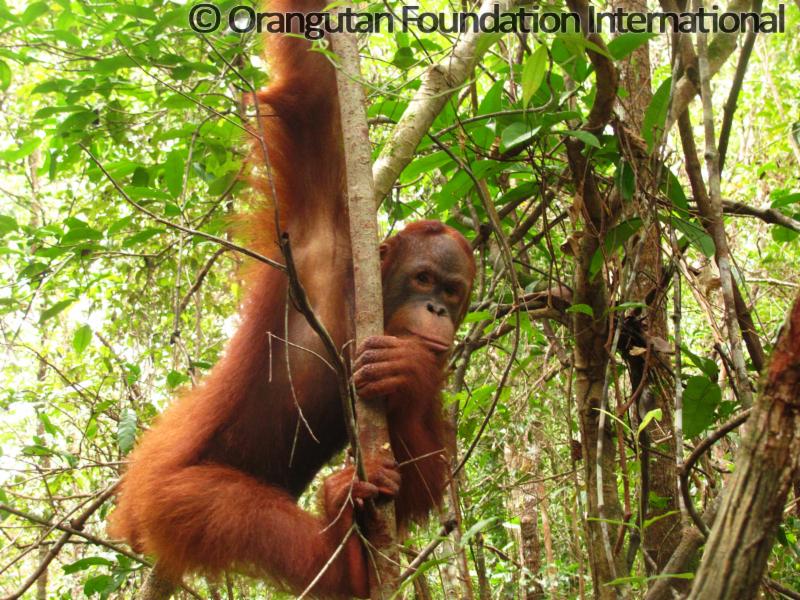
"Without a doubt, the most lively and boisterous age group of orphaned orangutans at the Orangutan Foundation International (OFI) Orangutan Care Centre and Quarantine (OCCQ) are the juveniles. Between five and nine years of age, these juvenile orangutans are full of energy and curiosity.
From their initial arrival at the OCCQ, orphaned orangutans are lovingly cared for by OFI caregivers who fulfill the role of surrogate mother. As the orangutans grow, they become more independent and self-sufficient. They graduate from the infant playground into the OFI Nursery Forest to spend more time in the trees. These juvenile orangutans receive love and support from the caregivers, but are given more independence when in the forest each day. For the juveniles, this is their opportunity to refine their forest skills - skills that are essential for their eventual return to the wild. Juvenile orangutans are still too young to live by themselves in the wild. Yet they are learning new skills every day and are well on the road to rehabilitation, one step closer to their return to the wild.
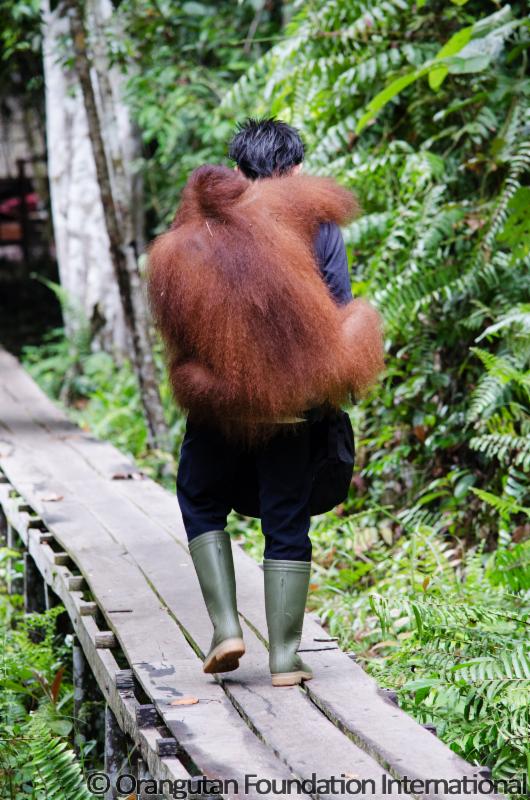 Each day the juvenile orangutans are led out into the OFI Nursery Forest to play and practice their forest skills. The forest is buzzing with boisterous red-heads climbing, somersaulting, playing, nest-building, and exploring their surroundings. Forest time is the favorite time of day and they know how to make the most of it! Some orangutans spend time building tree-top nests for relaxation. Others are in hot pursuit of a friend, swinging with vigor through the trees in a game of 'follow the leader.' Other youngsters are digging in the earth with a stick to find termites, a favorite snack. And some are off on their own, picking leaves and sampling the freshest forest delights... Each day the juvenile orangutans are led out into the OFI Nursery Forest to play and practice their forest skills. The forest is buzzing with boisterous red-heads climbing, somersaulting, playing, nest-building, and exploring their surroundings. Forest time is the favorite time of day and they know how to make the most of it! Some orangutans spend time building tree-top nests for relaxation. Others are in hot pursuit of a friend, swinging with vigor through the trees in a game of 'follow the leader.' Other youngsters are digging in the earth with a stick to find termites, a favorite snack. And some are off on their own, picking leaves and sampling the freshest forest delights...
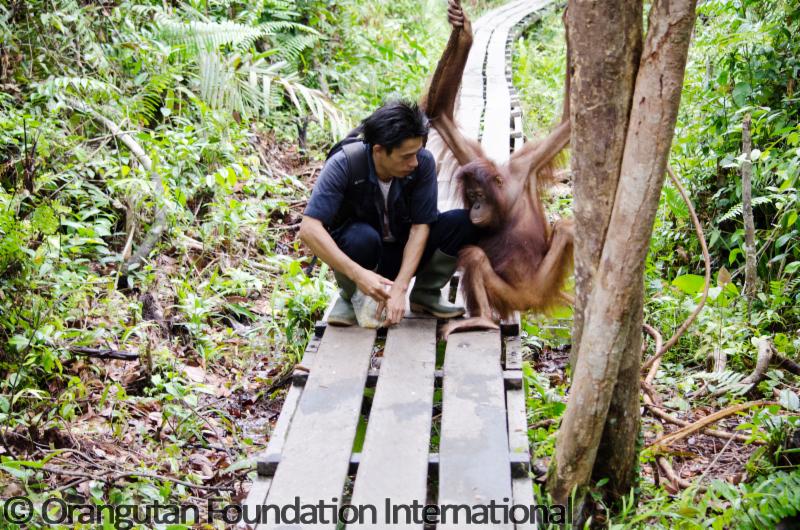 ...At the end of each day, the juvenile orangutans are coaxed down from the trees to return to their sleeping enclosures. This can be a difficult endeavor as many of the juveniles do not want to leave the forest. Some will refuse to come down and others will play chase through the trees. However, caregivers almost always succeed in enticing the juvenile down. A tempting treat of fruit usually does the trick..."
|

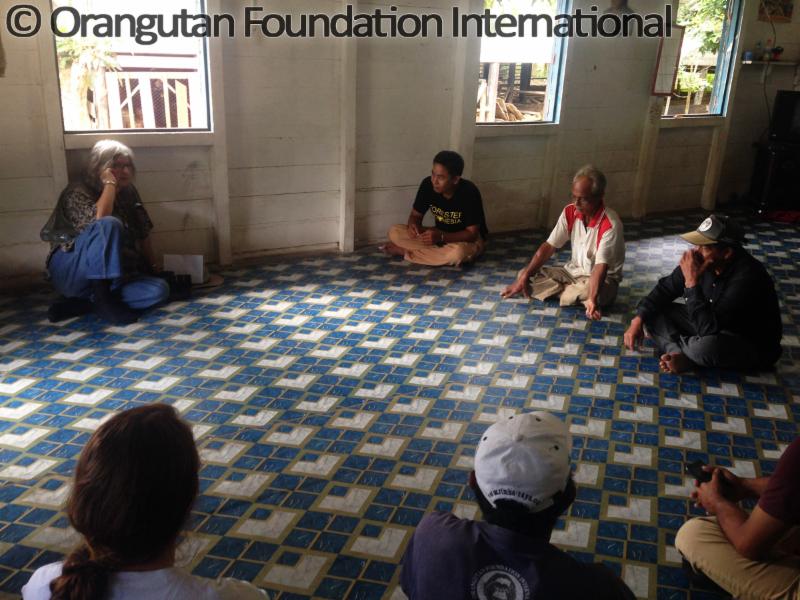 "We had been driving for hours through palm oil plantations, desperately seeking out patches of protected rainforest we had been told existed but somehow could not find. At top speeds we flew blindly through the dust of cars in front of us, weaving across the broad dirt roads to avoid potholes or overtake giant tank-like vehicles (carrying crude palm oil) that looked like they belonged in a post-apocalyptic warzone. Logging trucks loaded down with lumber passed us going the opposite direction, only heightening the sense of urgency in our search. Whenever the dust didn't clear fast enough for the driver to see a pothole or bump in the road, my head hit against the door, my stomach lurched, and I more acutely felt the heat and dehydration. Our car was silent. We were all resigned to the road, to the carsickness, to the exhaustion, to the bewildering scenes that flashed by every time the dust cleared enough to see out the windows. The protected forests were out there somewhere. We had maps, we had directions from local authorities, we had GPS experts, but we got so lost in the palm oil plantations that we just couldn't find them... "We had been driving for hours through palm oil plantations, desperately seeking out patches of protected rainforest we had been told existed but somehow could not find. At top speeds we flew blindly through the dust of cars in front of us, weaving across the broad dirt roads to avoid potholes or overtake giant tank-like vehicles (carrying crude palm oil) that looked like they belonged in a post-apocalyptic warzone. Logging trucks loaded down with lumber passed us going the opposite direction, only heightening the sense of urgency in our search. Whenever the dust didn't clear fast enough for the driver to see a pothole or bump in the road, my head hit against the door, my stomach lurched, and I more acutely felt the heat and dehydration. Our car was silent. We were all resigned to the road, to the carsickness, to the exhaustion, to the bewildering scenes that flashed by every time the dust cleared enough to see out the windows. The protected forests were out there somewhere. We had maps, we had directions from local authorities, we had GPS experts, but we got so lost in the palm oil plantations that we just couldn't find them...
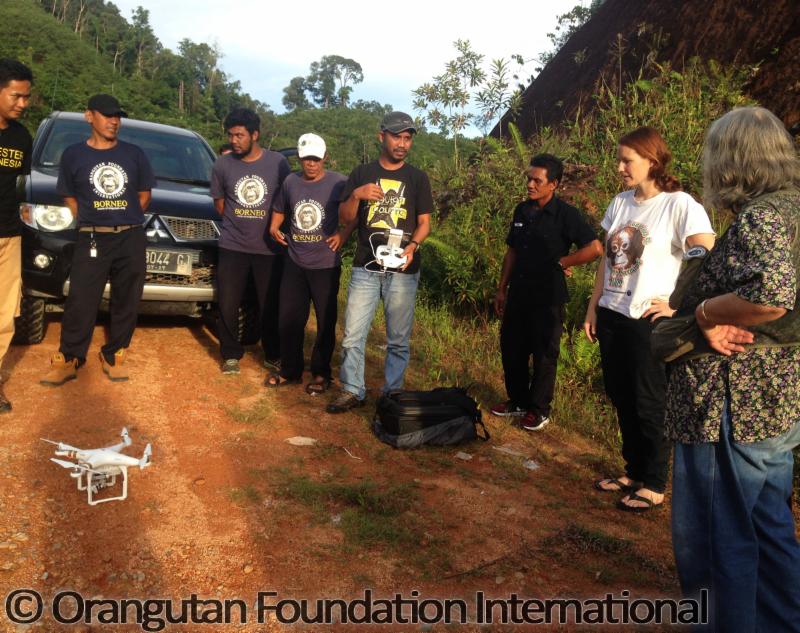 Our expedition started smoothly. We had three cars packed full with a diverse, capable team of OFI Indonesian staff - including research assistants from Camp Leakey, GPS/GIS experts, and managers from OFI's office in Pangkalan Bun and the Orangutan Care Center and Quarantine in Pasir Panjang. The first leg of our journey took us to the lavish office of the bupati (head) of the Lamandau Regency, where Dr. Galdikas laid out the team's plans and aspirations. The bupati was supportive and suggested areas to search, even drawing up a map for reference. Upon leaving the bupati's office we immediately set out for one of the areas he had indicated, which was up in the mountains... Our expedition started smoothly. We had three cars packed full with a diverse, capable team of OFI Indonesian staff - including research assistants from Camp Leakey, GPS/GIS experts, and managers from OFI's office in Pangkalan Bun and the Orangutan Care Center and Quarantine in Pasir Panjang. The first leg of our journey took us to the lavish office of the bupati (head) of the Lamandau Regency, where Dr. Galdikas laid out the team's plans and aspirations. The bupati was supportive and suggested areas to search, even drawing up a map for reference. Upon leaving the bupati's office we immediately set out for one of the areas he had indicated, which was up in the mountains...
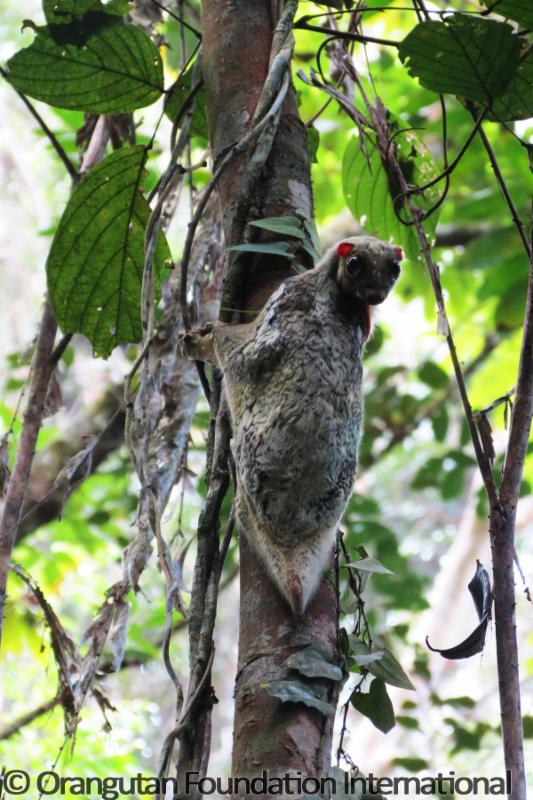 ...The divisions between different patches of forest were stark. In the area of forest that was currently being used fairly heavily by the local community for fruit production and other extractive activities, bird songs were few and far between. For at least an hour we neither heard nor saw anything noteworthy. But as soon as we crossed into the forest that the community was preserving for potential future use, we encountered several orangutan nests, occasionally heard the calls of hornbills and gibbons amidst the constant roaring of cicadas, found the forest floor to be littered with fruit remains, and even encountered a colugo - an elusive, nocturnal gliding mammal. It felt like real rainforest..." ...The divisions between different patches of forest were stark. In the area of forest that was currently being used fairly heavily by the local community for fruit production and other extractive activities, bird songs were few and far between. For at least an hour we neither heard nor saw anything noteworthy. But as soon as we crossed into the forest that the community was preserving for potential future use, we encountered several orangutan nests, occasionally heard the calls of hornbills and gibbons amidst the constant roaring of cicadas, found the forest floor to be littered with fruit remains, and even encountered a colugo - an elusive, nocturnal gliding mammal. It felt like real rainforest..."
|
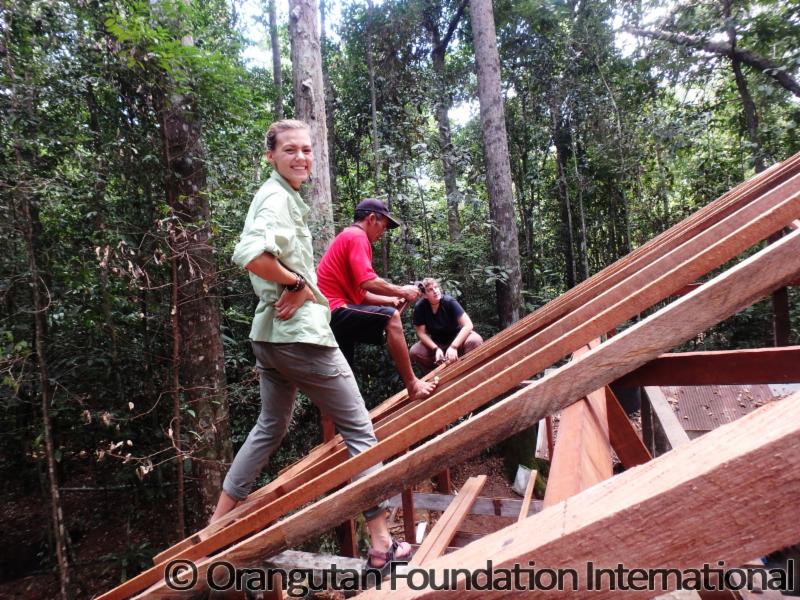
"
In July and August 2016, OFI volunteers spent three weeks walking over 100 kilometers apiece through forest trails riddled with roots, rivers, swamps, and huge fallen trees, collectively carrying 350 wooden planks and a whole camp's worth of supplies and equipment (including a generator) and food (including giant sacks of rice), sometimes in the rain. The volunteers withstood crippling blisters, sprained ankles, shoulders rubbed raw by wood, bruises, cuts, infections, and all kinds of illness. This self-sacrifice was all done in support of one of the most challenging and important projects OFI has yet undertaken with its volunteer construction teams.
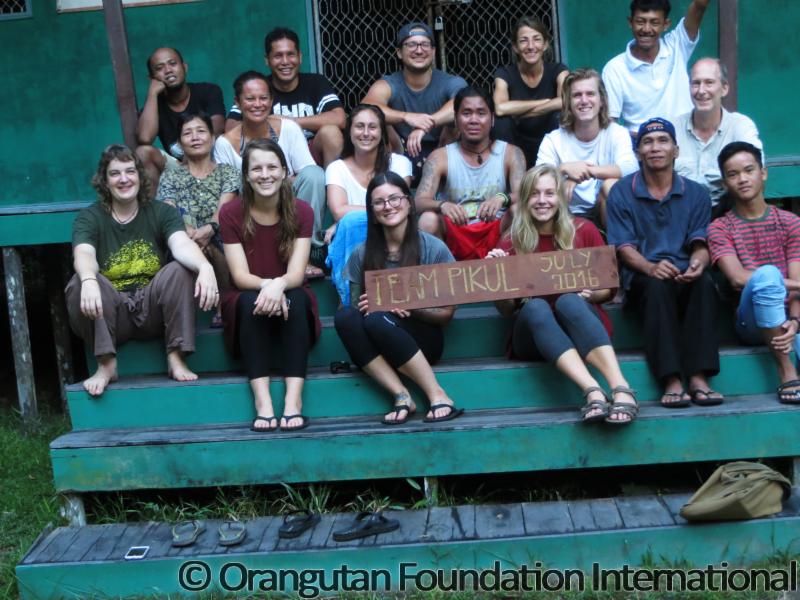 This year OFI's volunteer construction teams were tasked with rebuilding an old patrol post at the edge of the Camp Leakey study area in Tanjung Puting National Park. The post, named "Pos 17," or Post 17 is seven kilometers (4.4 miles) from Camp Leakey and was built in 2002 primarily as a base for OFI rangers to patrol for illegal loggers. When the illegal logging problem died down and OFI started to focus its resources on more pressing issues, Post 17 was largely abandoned and fell into disrepair. Now some years later, as live bird poaching and other illegal extractive activities arise in the National Park and the Camp Leakey study area, it has become apparent that renewed patrols are ever urgently needed to protect the forests and the biodiversity that supports wild orangutan existence..."
This year OFI's volunteer construction teams were tasked with rebuilding an old patrol post at the edge of the Camp Leakey study area in Tanjung Puting National Park. The post, named "Pos 17," or Post 17 is seven kilometers (4.4 miles) from Camp Leakey and was built in 2002 primarily as a base for OFI rangers to patrol for illegal loggers. When the illegal logging problem died down and OFI started to focus its resources on more pressing issues, Post 17 was largely abandoned and fell into disrepair. Now some years later, as live bird poaching and other illegal extractive activities arise in the National Park and the Camp Leakey study area, it has become apparent that renewed patrols are ever urgently needed to protect the forests and the biodiversity that supports wild orangutan existence..."
|
|
2016 is the 30th Anniversary of Orangutan Foundation International!
|
|
| |
|